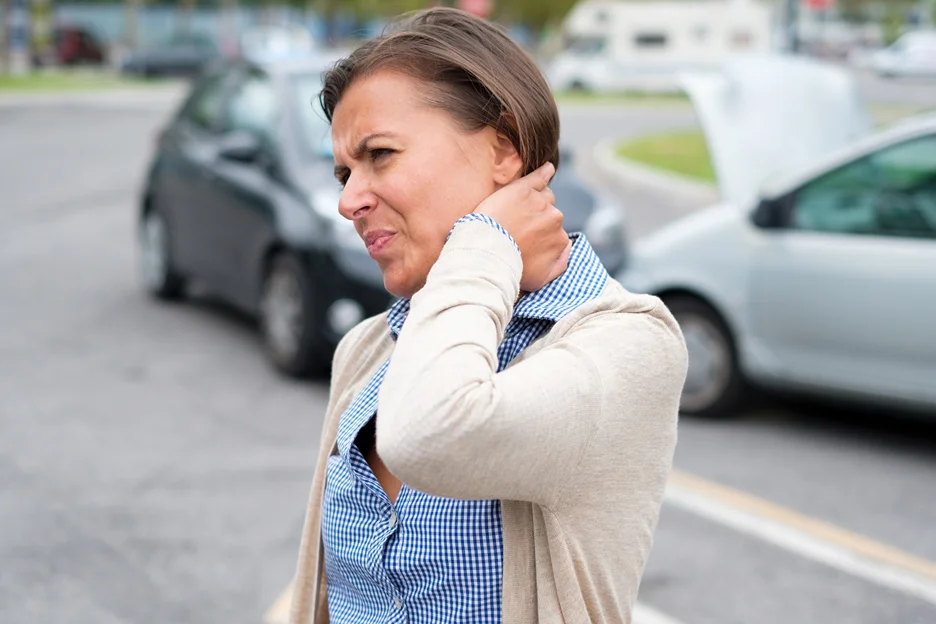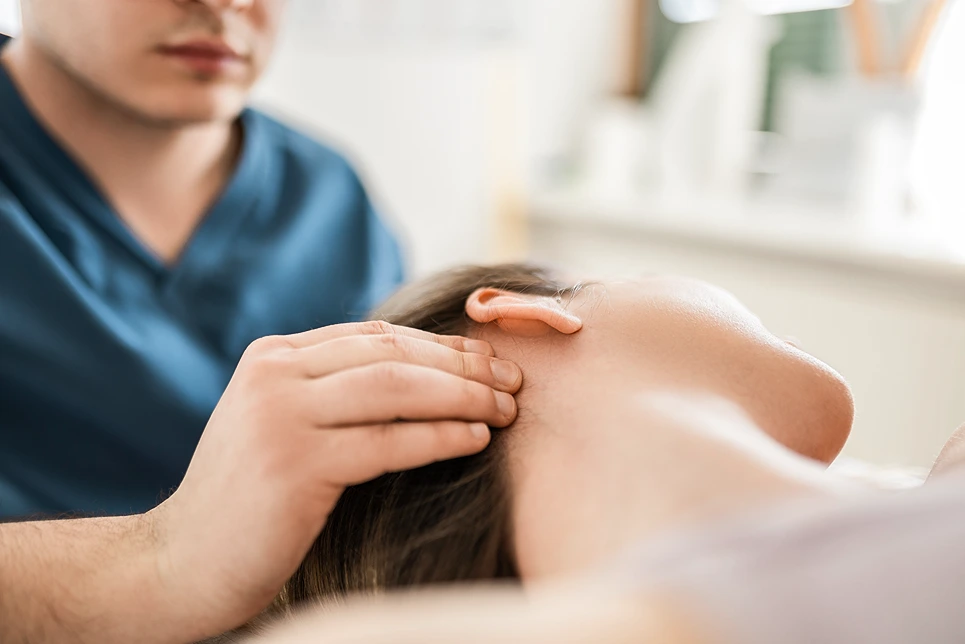Neck pain is one of the most common injuries suffered in auto accidents. Based on our experience with Kaly clients, even minor collisions can damage muscles, ligaments, and nerves in the cervical spine, leading to pain, stiffness, and disability.
This guide answers the key questions surrounding these post-accident neck injuries so you can seek proper treatment and manage your recovery.
What are the common neck injuries after a car accident?

The most common neck injuries after a car accident are whiplash, accounting for 83% of cases per an NCBI study. Neck sprains or strains involving overstretched muscles and soft tissues without major head motion follow. Less common are herniated discs from high-impact collisions.
According to Kaly specialists, whiplash occurs when the head jerks suddenly back and forth, overextending the neck’s normal range of motion which can damage muscles, ligaments, nerve roots, and joints. Most whiplash cases are mild with muscle tenderness and reduced mobility but severe cases can cause lasting headaches, nerve issues, and loss of function.
But severe whiplash associated with structural injury can lead to chronic headaches, nerve disturbances, and ongoing functional impairment.
- Neck sprains or strains involve overstretching the muscles and soft tissues without the dramatic head motion seen in whiplash. While the neck is wrenched beyond its normal limits, there is no whip-like movement.
- Strains stem from localized overstretching versus broader torsional forces. There may be some muscle fiber tears and inflammation but no major joint or disc disruption.
- Compared to whiplash, strains provoke more localized neck pain, spasms, and decreased mobility. However, there is no nerve root irritation or facet joint trauma.
What are the symptoms of a car crash neck injury?
The primary symptom of a car crash neck injury is pain manifesting as soreness, stiffness, and tenderness, exacerbated by any neck motion. Other common symptoms include reduced range of motion, muscle tightness, headaches, and radiating pain into the shoulders, upper back, or arms.
A study by the American Academy of Orthopaedic Surgeons (AAOS) confirms additional symptoms may be dizziness, blurred vision, ringing ears, and balance problems.
The hallmark symptom of any neck injury in a collision is pain, which presents as soreness, stiffness, and tenderness in the neck. Certain motions like turning the head side to side or looking up and down tend to exacerbate the discomfort.
Muscle tightness and spasms may also arise, felt as taut bands with twitching and throbbing. Headaches are also very common, stemming from irritated nerves and tense cervical muscles.
In some cases, pain radiates from the neck into the adjacent shoulders, upper back, or arms. This suggests potential disc or facet joint injury irritating nerve roots. Rarely, symptoms like dizziness, blurred vision, tinnitus, and balance problems occur, signaling vertebral artery trauma.
Based on our experience, careful evaluation of all symptoms after an accident guides effective diagnosis and treatment.
What does neck strain from a car accident feel like?
Neck strain from a car accident causes stiffness and difficulty moving the head in any direction. Pain described as dull, aching, or stabbing can range from mild soreness to severe debilitation depending on the degree of muscle and soft tissue injury.
Discomfort stems from inflammation and microtears in the strained tissues. The hallmark sensation of neck strain after a car accident is stiffness and difficulty moving the head accompanied by varying degrees of pain.
Attempted neck motion meets with tightness and resistance due to inflammation and microtears in the strained muscles and soft tissues. This produces an inflexible, weak feeling with activities requiring head movement.
According to our experience, routine activities requiring head movement become strenuous due to the inflexibility and pain. Stress and fatigue worsen the symptoms over the course of the day.
What can cause delayed neck pain after a car accident?
Delayed onset neck pain after a car accident can occur due to adrenaline masking the initial ache, minor tears worsening over time, and disc or ligament injuries not apparent initially, as explained in a study by the Journal of the American Medical Association (JAMA).
Gradual symptom development happens as inflammation builds up to irritate nerves and restrict movement in the hours or days following the collision.
Adrenaline surge, progressively worsening minor tears, and non-obvious trauma can all contribute to delayed neck pain after an accident. The gradual pain response arises as inflammation increases over hours or days post-collision to irritate nerves and limit mobility.
Though delayed, prompt diagnosis and care helps prevent simple strains from becoming chronic dysfunction.
In some cases, neck pain is not felt immediately after a collision but arises gradually in the hours or days after. Several factors can contribute to this delayed onset of discomfort:
- The adrenaline rush during the accident masks early ache which manifests later as adrenaline fades. Inflammation builds up over time, worsening pain.
- Minor muscle or ligament tears seem fine initially but worsen and become aggravated with increased activity over the subsequent days.
- Disc, facet, or ligament injuries are sometimes not apparent at first, arising later as structures swell, shift, and impinge nerves.
Basically, the body’s pain response is delayed following the adrenaline surge. Minor strains also take time to manifest fully as inflammation progresses. Kaly recommends seeking prompt treatment to prevent uncomplicated strains from worsening into lasting dysfunction.
What are the effects of a neck injury from a car accident?
Neck injuries from car accidents can cause acute issues like headaches, insomnia, concentration problems, and chronic effects including reduced mobility, radiating pain, tingling, spinal degeneration, and emotional impact. Lingering muscle tension frequently triggers migraines.
A study conducted by the National Center for Biotechnology Information (NCBI) found that neck pain is more prevalent in individuals with a history of motor vehicle accidents (MVAs). The study, which followed a cohort of patients over a year, found that those involved in MVAs reported higher levels of continuous neck pain and disability compared to those who had not reported such an accident.
The study also identified MVAs and a longer duration of complaints as prognostic factors for continuous neck pain.
Based on Kaly specialists’ experience:
- In the short term, neck injuries result in headaches, difficulty sleeping, and impaired focus.
- Long-term effects cover reduced mobility, radiating limb pain, neuropathy, spinal degeneration, posture changes, and associated emotional problems like depression and anxiety.
- Ongoing muscle tension often produces chronic migraines.
Performing routine activities often becomes difficult due to limited mobility. Over months and years, accelerated degenerative changes occur in the cervical spine along with progressive nerve damage. Loss of the neck’s normal curvature alters posture.
Nerve impingement causes chronic radiating pain, numbness, and weakness in the shoulders, arms, and hands. Long-term effects also include chronic migraine headaches, anxiety, depression, and reduced quality of life.
What causes neck ache after a car accident?

Common causes of post-accident neck ache include damaged muscles, ligaments, discs, joints, and soft tissues. Swelling of these injured structures irritates local nerves and restricts range of motion. Poor posture while avoiding pain can also strain the cervical spine. Targeted diagnosis guides appropriate treatment.
A study conducted in Rotterdam and its suburban region, published by the National Center for Biotechnology Information (NCBI), found that neck pain is more prevalent in individuals with a history of a motor vehicle accident (MVA).
The study involved 187 patients, 42 of whom had been involved in an MVA. The MVA subgroup reported higher levels of continuous neck pain (63% versus 40%) and higher neck disability index scores (11.0 versus 7.1) compared to the rest of the cohort. The study concluded that an MVA and a longer duration of complaints are prognostic factors for continuous neck pain
Another study investigated the influence of neck muscle activation on whiplash neck injury in different severities of frontal and rear-end impact collisions. The study found that the neck’s active muscle force increased the disruptions of the upper cervical spine ligaments under all collision severities, especially the alar ligament.
This is in agreement with MRI findings that 72% of whiplash patients in frontal collisions and 58% of rear-end collisions exhibited potential alar damage.
There are several potential sources of neck ache after a motor vehicle collision:
- Strained muscles and ligaments from excessive stretching or whiplash forces
- Bulging, herniated, or degenerative discs irritating nerve roots
- Inflammation of facet joints between vertebrae
- Misaligned vertebrae causing abnormal stresses
- Poor posture from guarding the painful neck area
- Direct contusions to cervical muscles and soft tissues
- Injured structures like muscles, joints, and discs swell after accident trauma, compressing local nerves and blood vessels. Inflamed tissues press on each other, while poor posture adds abnormal stresses. Appropriate diagnosis pinpoints the exact sources of pain so targeted treatment can begin.
Why is there throat pain after a car accident?
Throat pain after a car accident often stems from whiplash injuring the nerves supplying the larynx and neck muscles tensing upward. Direct trauma from airbags, disc herniations pressing cervical nerves, and strained throat ligaments can also spark soreness and irritation around the laryngeal structures.
Direct blows to the delicate laryngeal structures from the airbag or steering wheel impact can also cause bruising and inflammation. In addition, herniated cervical discs compressing nerve roots that innervate the larynx contribute to soreness.
What should I do if my neck hurts after a car accident?
Kaly recommends getting medically evaluated, limiting activity, icing, bracing, medication, and physical therapy when neck pain manifests after an accident to properly diagnose and treat any trauma while avoiding aggravating unchecked strains.
Proper posture limits added stress, facilitating tissue healing and pain relief. Follow-up monitoring ensures effective recovery. Kaly suggests following these tips as well:
- See your doctor promptly after the car accident to assess for any whiplash, sprains, disc injuries, or fractures and begin appropriate treatment.
- Diagnostic imaging like X-rays, CT scans, or MRI help identify damage.
- Restrict activity that worsens pain to prevent further injury in the meantime. Apply ice packs to ease swelling and discomfort.
- Over-the-counter anti-inflammatories like ibuprofen may help per medical guidance. Wearing a prescribed soft cervical collar or brace supports the neck temporarily.
- Physical therapy involving gentle neck exercises improves mobility once inflammation subsides.
- Massage therapy can also relax tense muscles post-accident. Maintain proper posture by avoiding hunching over at a computer or looking down at phones.
- Follow up as directed through the full recovery process.
How to relieve neck pain from a car accident?

Applying heat or ice, taking anti-inflammatory medication, receiving chiropractic or massage therapy, performing prescribed exercises, using traction devices, learning stress management skills, and modifying health habits. Complementary treatments like acupuncture can provide cumulative pain relief when combined in a multidisciplinary program.
There are various conservative treatment options to help relieve neck pain stemming from a car accident injury:
- Your doctor may prescribe anti-inflammatory medications or muscle relaxants to reduce swelling and discomfort. Physiotherapy provides gentle mobilization, stretches, and strengthening exercises. Chiropractic adjustments can restore joint mobility, but be mindful of its risks such as stroke and artery dissection. Massage techniques release tense muscles.
- At home, use ice or heat packs for pain relief as proven by an NCBI study, and maintain proper neck support with pillows. A healthy diet, sleep habits, hydration, and gradual exercise aid healing.
What is the treatment for whiplash injury from a car accident?
The majority of whiplash injuries heal with conservative treatment like braces, medication, physical therapy, chiropractic care, and at-home practices to control pain, decrease inflammation, and gently mobilize the cervical spine.
Severe neurological impairment or instability may require ablation procedures, injections, or surgery, but these interventions are typically a last resort.
More specifically, an initial soft collar immobilizes the neck while icing and NSAIDs help relieve acute swelling and pain. Based on our experience, your physician may also prescribe muscle relaxants to address painful spasms.
A systematic review and meta-analysis of randomized controlled trials found that conservative management was more effective for pain reduction at 6 months and 1-3 years.
According to Kaly specialist’s experience, physical therapy starts with gentle range of motion and isometric exercises, progressing to resistance training later on. Chiropractic adjustments restore intersegmental movement and neuromuscular function. Massage therapy relaxes strained muscles.
For lasting whiplash pain, epidural steroid injections, medial branch nerve blocks, and radiofrequency neurotomy may calm irritated nerves when conservative measures plateau.
Surgery like anterior cervical discectomy and fusion is reserved for cases involving severe neurological deficits in the arms or compromised stability with ongoing pain. However, over 90% of whiplash injuries resolve favorably with nonsurgical rehabilitation when promptly and appropriately treated.
How long does back neck pain after a car accident last?
The duration of post-accident neck pain varies considerably depending on factors like injury severity, age, nerve involvement, treatment access, and patient compliance.
- Mild muscle or ligament sprains often resolve within 2 to 4 weeks with conservative treatment like rest, ice, medication, and gentle stretches.
- Moderate strains involving ligament laxity or disc injury typically cause pain and stiffness lingering for 2 to 3 months with ongoing mobilization exercises, spinal adjustments, and physical therapy.
- However, severe trauma like fractures, disc herniations with nerve compression, or spinal cord involvement may result in some level of pain persisting for over 6 months. Prognosis worsens if injuries involve neurological deficits.
What to expect in neck injury compensation from a car accident settlement?
The compensation amount for a neck injury car accident settlement depends on factors like severity, treatment needs, recovery time, impact on work and activities, and contributory negligence laws. Mild strains resolve faster, while moderate injuries require more treatment. Severe trauma with permanent impairment warrants higher settlements.
- More specifically, minor muscle strains treated with a few physical therapy sessions and over-the-counter medications typically garner smaller settlements, as symptoms resolve within weeks.
- Moderate neck sprains needing months of chiropractic care, prescription medication, therapy, and activity modifications warrant more compensation for the increased treatment burden and recovery time.
- Severely herniated discs requiring surgery and resulting in permanent physical restrictions or disability qualify for larger settlements, as the effects are lasting.
Your attorney will seek compensation for all medical expenses, lost income, household and mobility assistance, and pain and suffering based on standard industry calculators. State laws and liability findings factor in as well.
The amount of compensation for a neck injury car accident settlement depends on several factors:
- Severity of injury and prognosis – mild strains resolve faster than moderate or severe trauma
- Ongoing treatment needs – moderate injuries require more care over months
- Recovery time – longer disability warrants higher settlements
- Impact on work capacity and daily activities
- Contributory negligence laws by state
- Medical costs, lost wages, home/mobility assistance
- Pain and suffering calculators
An experienced personal injury attorney thoroughly evaluates these factors to seek fair compensation through negotiation or trial.
What is a fair neck pain settlement after a car accident?
While every neck injury case is unique, research of comparable settlements and jury verdicts provides general ranges, with mild strains averaging $3,000-$8,000, moderate injuries $15,000-$50,000, and severe trauma with surgery over $100,000 depending on state laws. Consult an attorney to determine a fair value.
More specifically, minor muscle strains typically net between $15,000 to $50,000 on average, as symptoms are limited to several weeks of pain, stiffness, and reduced mobility.
However, severe injuries involving medical complications, permanent impairment, and disability qualify for much higher values, with many valid claims exceeding $100,000. In fact, the national average hovers at $285,000, according to Finkelstein & Partners, LLP.
An experienced personal injury attorney thoroughly evaluates your neck trauma severity and impact to estimate a fair potential payout, negotiate the highest possible settlement, and take your case to court if needed.
Get Customized Treatment For Crash-Related Neck Pain With Kaly’s Provider Matching

To summarize our points above, neck strains and whiplash are common car accident injuries but can improve with rest, conservative treatment, therapy, pain management, healthy lifestyle habits, and time. Consulting a personal injury attorney helps maximize compensation.
Though painful initially, implementing a multifaceted treatment plan facilitates recovery. Seeking prompt medical attention provides an accurate diagnosis, targeted treatment, and documentation to support your injury claim and optimize results.
Neck injury from a crash causing persistent problems? Leverage Kaly’s network to find an accomplished orthopedic hand specialist for tailored treatment now!
